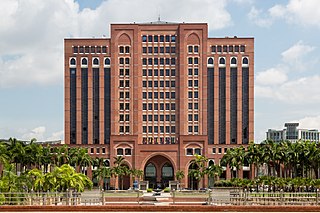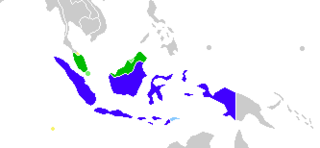
The Immigration Reform and Control Act was passed by the 99th United States Congress and signed into law by President Ronald Reagan on November 6, 1986.

The situation of human rights in Malaysia is controversial as there have been numerous allegations of human rights abuses in the country. Human rights groups and foreign governments are generally critical of the Malaysian government and the Royal Malaysian Police. Preventive detention laws such as the Internal Security Act and the Emergency Ordinance 1969 allow for detention without trial or charge and as such are a source of concern for human rights organisations like SUARAM.
Illegal immigration to Malaysia is the cross-border movement of people to Malaysia under conditions where official authorisation is lacking, breached, expired, fraudulent, or irregular. The cross-border movement of workers has become well-established in Southeast Asia, with Malaysia a major labour-receiving country and Indonesia and the Philippines the region's main labour-sending states. Managing cross-border migration has become an issue of increasing concern in Malaysia and its international relations.
Illegal immigration to the United States is the process of migrating into the United States in violation of federal immigration laws. This can include foreign nationals who have entered the United States illegally, as well as those who entered legally but remained after the expiration of their entry visa or parole documents. Illegal immigration has been a matter of strong debate in the United States since the 1980s, and has been a major focus of President Donald Trump, as illustrated by his campaign to build a wall along the Mexico border.
Illegal immigration refers to the migration of people into a country in violation of the immigration laws of that country, or the continued residence of people without the legal right to live in that country. Illegal immigration tends to be financially upward, from poorer to richer countries. Illegal residence in another country creates the risk of being detained and deported, or facing other sanctions.
Immigration to Singapore is historically the main impetus for population growth in the country since the founding of modern Singapore in the early 19th century. Immigration and immigrant workers in Singapore have been closely associated with Singapore's economic development. For a long period after its founding, the majority of Singapore's population were immigrants. It was not until around the 1930s that the number of native births in Singapore would overtake net immigration. After its expulsion from Malaysia in 1965, immigration laws were modified in 1966 to reinforce Singapore's identity as a sovereign state. However, the initial strict controls on immigrant workers were relaxed as demand for labour grew with increased industrialisation. Immigration would again become the largest contributor to population increase in Singapore in the late 20th century and early 21st century.
Immigration to Malaysia is the process by which people migrate to Malaysia to reside in the country. The majority of these individuals become Malaysian citizens. After 1957, domestic immigration law and policy went through major changes, most notably with the Immigration Act 1959/63. Malaysian immigration policies are still evolving.
Project IC is the name used in Malaysia to describe the allegation of systematic granting of citizenship to immigrants by giving them identity cards and subsequently its current iteration, the MyKad. The alleged practice is centred in the state of Sabah in East Malaysia. The term is used mainly by the media as well as other political commentators and the general public. Another term used is Project M, the "M" referring to former prime minister Mahathir Mohamad due to his being allegedly involved in the spearheading of this project.
Taiwan is primarily a destination for men, women, and children trafficked for the purposes of forced labor and sexual exploitation. It is also a source of women trafficked to Japan, Australia, the United Kingdom, and the United States. Women and girls from the People's Republic of China (P.R.C.) and Southeast Asian countries are trafficked to Taiwan through fraudulent marriages, deceptive employment offers, and illegal smuggling for sexual exploitation and forced labor. Many trafficking victims are workers from rural areas of Vietnam, Thailand, Indonesia, and the Philippines, employed through recruitment agencies and brokers to perform low skilled work in Taiwan’s construction, fishing, and manufacturing industries, or to work as domestic servants. Such workers are often charged high job placement and service fees, up to $14,000, resulting in substantial debt that labor brokers or employers use as a tool for involuntary servitude. Many foreign workers remain vulnerable to trafficking because legal protections, oversight by authorities and enforcement efforts are inadequate. Taiwan authorities reported that traffickers continued to use fraudulent marriages to facilitate labor and sex trafficking, despite increased efforts by the authorities to prevent this practice. Some women who are smuggled onto Taiwan to seek illegal work were sometimes sold in auctions to sex traffickers, and subsequently forced to work in the commercial sex industry. NGOs reported a sharp increase during the reporting period in the number of boys rescued from prostitution, mainly discovered during police investigations of online social networking sites suspected of being front operations for prostitution rings.

Pakistanis in Malaysia form the largest Pakistani diaspora community in southeast Asia and they also make up the 6th largest group of foreign workers/nationals in Malaysia as of 30 June 2017 according to the Malaysia's home ministry.

The Bangladeshi diaspora consists of people of Bangladeshi descent who have immigrated to or were born in another country. First generation migrants may have moved abroad from Bangladesh for better living conditions, to escape poverty, to support their financial condition or to send money back to families in Bangladesh. Annual remittances received in Bangladesh were 15.4 billion dollars as of 2015.

Immigration to Pakistan refers to the settlement of foreign nationals in Pakistan. Immigration policy is overseen by the Interior Minister of Pakistan through the Directorate General Passports. Most immigrants are not eligible for citizenship or permanent residency, unless they are married to a Pakistani citizen or a Commonwealth citizen who has invested a minimum of PKR 5 million in the local economy.

Denmark–Malaysia relations refers to the current and historical relations between Denmark and Malaysia. Denmark has an embassy in Kuala Lumpur, and Malaysia is represented in Denmark, through its embassy in Stockholm, Sweden. Diplomatic relations was established in 1963. Current Danish ambassador to Malaysia is Nicolai Ruge.
Malaysia is a destination, and to a lesser extent, a source and transit country for women and children subjected to trafficking in persons, specifically conditions of forced prostitution and for men, women, and children who are in conditions of forced labour. The majority of trafficking victims are foreign workers who migrate willingly to Malaysia from Indonesia, Nepal, India, Thailand, China, the Philippines, Burma, Cambodia, Bangladesh, Pakistan, and Vietnam in search of greater economic opportunities, some of whom subsequently encounter forced labour or debt bondage at the hands of their employers, employment agents, or informal labour recruiters.
Although it is difficult to measure how many people reside in the UK without authorisation, a Home Office study based on Census 2001 data released in March 2005 estimated a population of between 310,000 and 570,000. The methods used are also much debated. Problems arise in particular from the very nature of the target population that is hidden and mostly wants to remain as such. The different definitions of ‘illegality’ adopted in the studies also pose a significant challenge to the comparability of the data.
Singapore is an attractive destination due to its high living standards and wages. The punishment for illegal immigration in the country are a mandatory caning sentence of not less than 3 strokes and a prison sentence.

The Immigration Department of Malaysia is a department of the Federal Government of Malaysia which provides services to Malaysian Citizens, Permanent Residents and Foreign Visitors.

Cambodia–Malaysia relations are foreign relations between Cambodia and Malaysia. Both countries are members of ASEAN. Cambodia has an embassy in Kuala Lumpur, and Malaysia has an embassy in Phnom Penh.

Malaysia–Myanmar relations are foreign relations between Malaysia and Myanmar. Both are the members of ASEAN and enjoys a good relations. Although the relations become strained in late 2016 due to the Rohingya issues, the relations remained stable after the meeting between both countries armed forces chief to playing down the issues. Myanmar currently has an embassy in Kuala Lumpur, and Malaysia has an embassy in Yangon.
The Malaysian diaspora are Malaysian emigrants from Malaysia and their descendants that reside in a foreign country. Population estimates vary from seven hundred thousand to one million, both descendants of early emigrants from Malaysia, as well as more recent emigrants from Malaysia. The largest of these foreign communities are on the Australian external territory of Christmas Island where they make up the majority as well as significant minorities in Singapore, Australia, Brunei and the United Kingdom.











